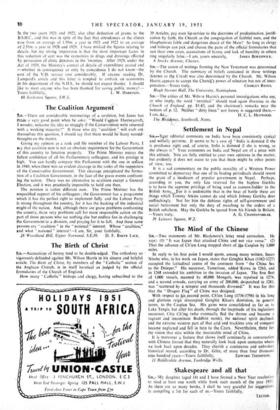The Mind of the Chinese
Sia.—Two statements of Mr. BLackmore's letter need correction. He says: (1) "It was Japan that attacked China and not vice versa." (21 That the advance of Ch'ien Lung stopped short of-,,flie Caspian by 1,000 miles.
In reply to his first point I would quote, among many writers, Inazo Nitobe who, in his work on Japan, states that Genghiz Khan (1162-1227) occupied the latitudinal centre of the continent from " the China Sea to the Dnieper." His successor, Tamerlane, added'Korea in 1263, and in 1268 extended his ambition to the invasion of Japan. The first fleet of 1,000 vessels, manned by 40,000 Mongols, was repulsed in 1274, and a second armada, carrying an army of 200,000, despatched in 1281, was " scattered by a tempest and thousands drowned." It was for this that the " Dragon Flag" of China was designed.
With respect to Ais Jsecond point, Ch'ien Lung (1736-1796) in his long and glorious reign reoccupied Genghiz Khan's dominion, in general terms, to the Caspian Sea. His gains were consolidated as far as to Lake Tengis, but after his death, through the ineptitude of his inglorious successor, Chia Ch'ing (who eventually fled the throne and became a Vagrant and innominate Buddhist monk), the national spirit declined. and the extreme western part of that arid and trackless area of conquest became neglected and fell in turn to the Czars. Nevertheless, there lies the vision that stirs within the inscrutable mind of China.
It is moreover a feature that shows itself continually in conversation with Chinese literati that they naturally look back upon centuries where
we look back upon decades. They cherish a continuous and unbroken historical record, according to Dr. Giles, of more than four thousand nine hundred years.—Yours faithfully, EDWARD THOMPSON. 11 Riddlesdale Avenue, Tunbridge Wells.


































 Previous page
Previous page